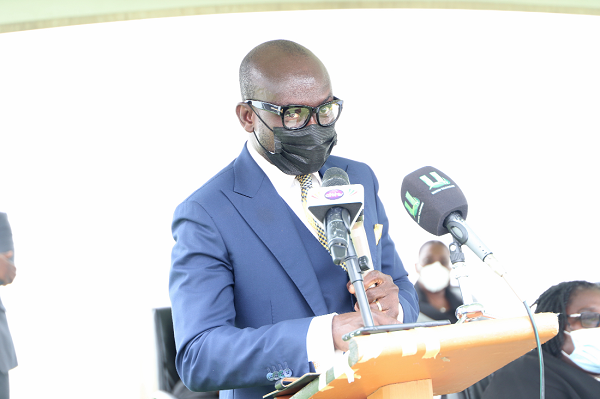
Law School seeks govt support for new structure
The acting Director of the Ghana Law School, Mr Maxwell Opoku-Agyemang, has appealed to the government to support the construction of an intended multipurpose structure to facilitate academic work in a more spacious environment.
"The land has been cleared and we have extended electricity and water supply to the site, but we do not have money to build on it," Mr Opoku-Agyemang said when he appealed for assistance for the project.
Advertisement
He explained that the construction of the "Law Village" would "make life comfortable for students and increase the enrolment of students”.
The intended structure — with a capacity for 1,500 students to enhance professional law education — has been earmarked on a site secured near the Graduate School of the University of Ghana Business School.
Mr Opoku-Agyemang made the appeal when the Attorney-General and Minister of Justice, Mr Godfred Yeboah Dame, interacted with the students, lecturers and management of the school to familiarise himself with some concerns of students and the school.
The minister is on a tour to familiarise himself with selected institutions after his nomination by the President and subsequent approval by Parliament.
Inadequate funds
For the first time since it was established in 1958, the management of the school this year began rehabilitation works on the physical infrastructure on the campus, solely from its internally generated funds (IGFs), Mr Opoku-Agyemang said,
"We received only GH¢100,000 (for this year) to run the three campuses. For a school which buys GH¢300 worth of water a day, the budget support for goods and services is not sufficient," he said.
Mr Opoku-Agyemang also revealed that the management of the school walked a financial tightrope last year due to the mass failure of students in the entrance examination.
"That almost caused the collapse of the school," he said.
He said the school's coffers were emptied after the government took 34 per cent share of its IGFs.
The acting director said the school had had to introduce a three-track system of teaching to ensure that the over 1,000 students who passed the entrance examination this year were adequately served without congestion in the classrooms.
He commended President Nana Addo Dankwa Akufo-Addo for donating a 53-seater bus to the school, and also thanked the Vice-President, Dr Mahamudu Bawumia, for making a personal donation of a 47-seater bus to the school.
He said the students, through the Students Representative Council (SRC), had also donated a 15-seater bus, while the school had secured a 54-seater vehicle out of its resources.
Commitment
Mr Dame indicated that the President was committed to seeing improvement in the justice delivery system in the country.
He assured the school of a substantial increment in the budgetary allocation in the mid-year budget in July.
He said the GH¢100,000 budget allocation for the Law school and the quantum of IGFs reserved for the school were woefully inadequate.
"It is unjustifiable that the law school gets only GH¢100,000. There must also be an increase in the amount to be retained from the school's IGFs. I have instructed the relevant heads to submit priority needs to be forwarded to the Ministry of Finance," he said.
On professional legal education, Mr Dame said there was the need to maintain high academic, professional and ethical standards.
He said he would work with the General Legal Council to ensure students lived up to the ethics of the legal profession.
He described the acting Director of the Law school as a visionary and commended him for giving the school its first facelift in more than 60 years.
Concerns
The acting President of the SRC, Mr Abokomah Amissah Koomson, appealed to the Attorney-General to intervene in what the students considered to be high tuition fees, examination remarking fees, registration fees for recall, among others.
Some of the students complained about the school’s referral policy during an open forum, while others complained about the £6,000 fee charged for post-call students — a year’s course designed for Ghanaians who have qualified in Common Law countries which operate a legal system analogous to Ghana’s.




